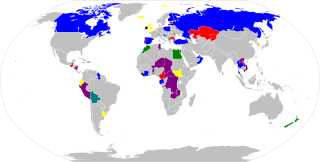 |
|---|
|
A constitutional referendum was held in Algeria on 5 May 1946 as part of a wider French constitutional referendum. The proposed new constitution was rejected by 51.5% of voters, with a turnout of 71%. [1]
 |
|---|
|
A constitutional referendum was held in Algeria on 5 May 1946 as part of a wider French constitutional referendum. The proposed new constitution was rejected by 51.5% of voters, with a turnout of 71%. [1]
| Choice | Votes | % |
|---|---|---|
| For | 175,049 | 48.5 |
| Against | 185,992 | 51.5 |
| Invalid/blank votes | 10,581 | – |
| Total | 371,622 | 100 |
| Registered voters/turnout | 523,584 | 71.0 |
| Source: Sternberger et al. | ||

In political science, an initiative is a means by which a petition signed by a certain number of registered voters can force a government to choose either to enact a law or hold a public vote in the legislature in what is called indirect initiative, or under direct initiative, where the proposition is put to a plebiscite or referendum, in what is called a Popular initiated Referendum or citizen-initiated referendum.
A constitutional amendment is a modification of the constitution of a polity, organization or other type of entity. Amendments are often interwoven into the relevant sections of an existing constitution, directly altering the text. Conversely, they can be appended to the constitution as supplemental additions, thus changing the frame of government without altering the existing text of the document.

The current Constitution of France was adopted on 4 October 1958. It is typically called the Constitution of the Fifth Republic(French: Constitution de la Ve République), and it replaced the Constitution of the Fourth Republic of 1946 with the exception of the preamble per a Constitutional Council decision in July 1971. The current Constitution regards the separation of church and state, democracy, social welfare, and indivisibility as core principles of the French state.

A referendum, in the Italian legal system is a request directed to the whole electorate to express their view on a determined question. It is the main instrument of direct democracy in Italy.
In Australia, referendums are public votes held on important issues where the electorate may approve or reject a certain proposal. The term is commonly used in reference to a constitutional referendum which is legally required to make a change to the Constitution of Australia.

National-level elections in Italy are called periodically to form a parliament consisting of two houses: the Chamber of Deputies with 400 members; and the Senate of the Republic with 200 elected members, plus a few appointed senators for life. Italy is a parliamentary republic: the President of the Republic is elected for a seven-year term by the two houses of Parliament in joint session, together with special electors appointed by the Regional Councils.

The Constitution of the Principality of Liechtenstein was promulgated on 5 October 1921, replacing the 1862 constitution. It was granted by Johann II, Prince of Liechtenstein, and established the rule of partial parliamentary democracy mixed with that of constitutional monarchy, as well as providing for referendums on decisions of the Landtag. It also abolished the three seats in the Landtag appointed by the Prince and lowered the voting age from 24 to 21.

A constitutional referendum was held in France on 5 May 1946. Voters were asked whether they approved of a new draft Constitution proposed by the Constituent Assembly elected in 1945.

A constitutional referendum was held in France on 28 September 1958. Voters were asked whether they approved of the adoption of a constitution for the French Fifth Republic written by Charles de Gaulle. It was overwhelmingly approved, with 82.6% in favour. Voter turnout was 84.9% in Metropolitan France and 79.8% overall.

A constitutional referendum was held in Spain on Wednesday, 6 December 1978, to gauge support for either the ratification or repealing of the Spanish Constitution which had been approved by the Cortes Generales on 31 October 1978. The question asked was "Do you approve of the Constitution Bill?". The referendum resulted in 91.8% of valid votes in support of the bill on a turnout of 67.1%.
This national electoral calendar for 2010 lists the national/federal elections held in 2010 in all sovereign states and their dependent territories. By-elections are excluded, though national referendums are included.

This national electoral calendar for 2011 lists the national/federal elections held in 2011 in all sovereign states and their dependent territories. By-elections are excluded, though national referendums are included.

A constitutional referendum was held in French Dahomey and French Togoland on 5 May 1946 as part of the wider French constitutional referendum. The new proposed new constitution was rejected by 55.4% of voters, with a turnout of 56.7%.
Two referendums were held in Switzerland in 1887. The first was held on 15 May, asking voters whether they approved of a federal law on spirits, and was approved by 65.9% of voters. The second was held on 10 July, asking voters whether they approved of an amendment made to article 64 of the federal constitution, and was approved by 77.9% of voters and 20.5 cantons.
Five referendums were held in Switzerland in 1891. The first was held on 15 March on a federal law on federal officials who had become unemployable due to disability, and was rejected by 79.4% of voters. The second was held on 5 July on a constitutional amendment, and was approved by 60.3% of voters. Two referendums were held on 18 October, one on revising article 39 of the federal constitution and one on a federal law on Swiss tariffs; both were approved. The last was held on 6 December on the question of whether the federal government should purchase the Swiss Central Railway, but was rejected by 68.9% of voters.
Four referendums were held in Switzerland in 1961. The first two were held on 5 March on an amendment to the constitution regarding oil pipelines and a fuel tax to fund national roads. The constitutional amendment was approved, but the fuel tax rejected. The third referendum was held on 22 October on a popular initiative on using popular initiatives for federal-level laws, and was rejected by voters. The fourth referendum was on a federal resolution on the clock industry, and was approved by two-thirds of voters.

In France there are two types of referendum:

A constitutional referendum was held in Italy on 4 December 2016. Voters were asked whether they approved a constitutional law that amends the Italian Constitution to reform the composition and powers of the Parliament of Italy, as well as the division of powers between the State, the regions, and administrative entities.

This national electoral calendar for 2023 lists the national/federal elections held, and scheduled to be held, in 2023 in all sovereign states and their dependent territories. By-elections are excluded, though national referendums are included. Specific dates are given where these are known.